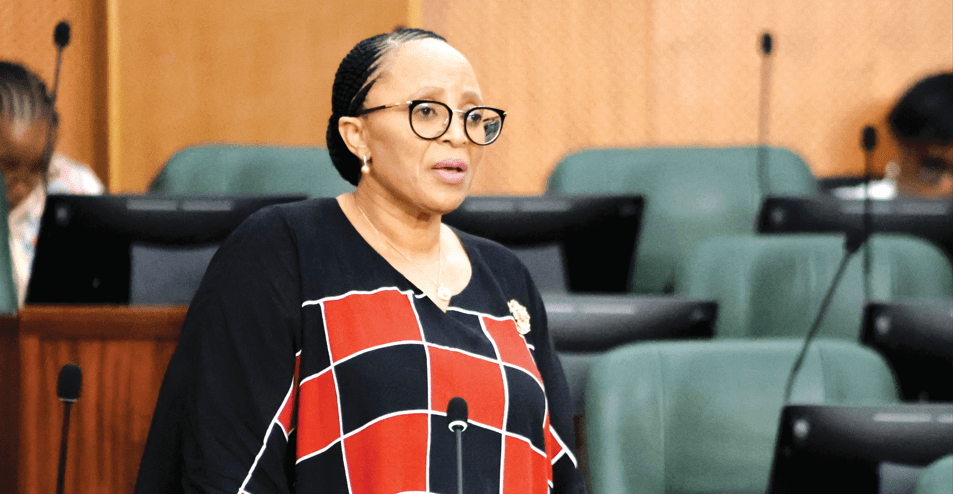During the first half of the current financial year, which began on April 1, the Directorate on Corruption and Economic Offences (DCEO) documented 220 reports of alleged corruption, money laundering, and related offences totalling M203.8 million.
This was revealed by Minister of Finance and Development Planning, Dr Retšelisitsoe Matlanyane, while delivering the mid-term budget speech for the 2024/2025 financial year to Parliament on Wednesday this week.
Matlanyane said that out of these reports, 162 cases were referred for further investigation, while 58 were directed to the appropriate institutions for action.
“Mr. Speaker, in our continuous efforts to combat corruption, the implementation of an in-house electronic case management system has greatly enhanced the DCEO’s capacity to manage case flow,” she said.
“A dedicated call center has also been established, enabling the public to report corruption incidents at any time and from any location,” she added.
DCEO’s spokesperson, ‘Matlhokomelo Senoko, confirmed the figures yesterday saying they reflected the agency’s activities during the first and second quarters of the financial year.
“The report is for the first and second quarters,” Senoko said.
Despite successive governments professing a commitment to eradicating corruption, the vice remains deeply entrenched in Lesotho’s public service.
DCEO, the country’s key anticorruption institution, has faced sharp criticism for its perceived inability to combat this pervasive issue effectively.
Commentators argue that Lesotho’s anti-corruption policies and accountability mechanisms are weak, while access to critical information remains elusive for citizens outside government circles.
In recent years, a series of scandals implicating ministers and the awarding of public contracts has further eroded public trust in the state.
The U.S. Department of State’s 2023 Country Reports on Human Rights Practices published in April this year underscored these concerns, acknowledging that while Lesotho’s laws provide for criminal penalties for corruption, their enforcement is inconsistent.
“There were numerous reports of government corruption, and some officials engaged in corrupt practices with impunity,” the report stated.
Lesotho’s standing in global corruption rankings paints a stark picture.
In Transparency International’s 2023 Corruption Perceptions Index (CPI), the country was ranked 93rd out of 180 nations, scoring a meager 39 out of 100.
The CPI ranks 180 countries and territories around the globe by their perceived levels of public sector corruption, scoring on a scale of 0 (highly corrupt) to 100 (very clean).
Over two-thirds of countries scored below 50 out of 100 in 2023, which strongly indicated that they had serious corruption problems. The global average was stuck at only 43, while the vast majority of countries had made no progress or declined in the last decade.
“Corrupt acts like bribery and abuse of power are also infiltrating many courts and other justice institutions across the globe. Where corruption is the norm, vulnerable people have restricted access to justice while the rich and powerful capture whole justice systems, at the expense of the common good,” Transparency International observed.
The troubling domestic trends were echoed in Afrobarometer’s latest findings published on November 14.
The survey revealed that nearly half of Basotho (48 percent) believe “most” or “all” Members of Parliament (MPs) are corrupt. Additionally, 69 percent of respondents expressed little to no trust in parliamentarians.
Afrobarometer report read: “Negative evaluations of Parliament have increased sharply over the past decade, reaching their highest levels in 2022 before declining somewhat in 2024. Disapproval of MPs’ job performance climbed from 43 percent of Basotho in 2017 to 76 percent in 2022, then came down to 64 percent in 2024.”
It added: “Similarly, distrust increased from 48 percent to 80 percent in 2022 before dropping back to 69 percent in 2024. And the share of citizens reporting perceptions of widespread corruption in Parliament tripled between 2014 (19 percent) and 2022 (57 percent) before decreasing by 9 percentage points.”
Afrobarometer is a pan-African, non-partisan survey research network that provides reliable data on African experiences and evaluations of democracy, governance, and quality of life.
Nine survey rounds in up to 42 countries have been completed since 1999. Round 10 surveys were launched in January 2024. Afrobarometer’s national partners conduct face-to-face interviews in the language of the respondent’s choice.
The Afrobarometer team in Lesotho, led by Advision Lesotho, interviewed a nationally representative sample of 1,200 adult Basotho in March 2024.
A sample of this size, according to the organisation, yields country-level results with a margin of error of +/-3 percentage points at a 95 percent confidence level.
Previous surveys were conducted in Lesotho in 2000, 2002, 2005, 2008, 2012, 2014, 2017, 2020, and 2022.
In a speech during the presentation of Lesotho’s 2025 Millennium Challenge Corporation (MCC) scorecard. U.S. Embassy Charge d’Affaires, Thomas Hines, acknowledged that Lesotho passed the overall scorecard but expressed concern over the country’s declining performance in the control of corruption indicator.
“Noting the decline in the control of corruption indicator, we seek avenues to do more together with Lesotho to combat corruption. Not only does regression in this area put Lesotho at risk of failing the scorecard, we also know the corrosive impact of corruption in the economy and society,” Hines remarked.
Summary
- During the first half of the current financial year, which began on April 1, the Directorate on Corruption and Economic Offences (DCEO) documented 220 reports of alleged corruption, money laundering, and related offences totalling M203.
- In recent years, a series of scandals implicating ministers and the awarding of public contracts has further eroded public trust in the state.
- Where corruption is the norm, vulnerable people have restricted access to justice while the rich and powerful capture whole justice systems, at the expense of the common good,” Transparency International observed.

Authored by our expert team of writers and editors, with thorough research.









